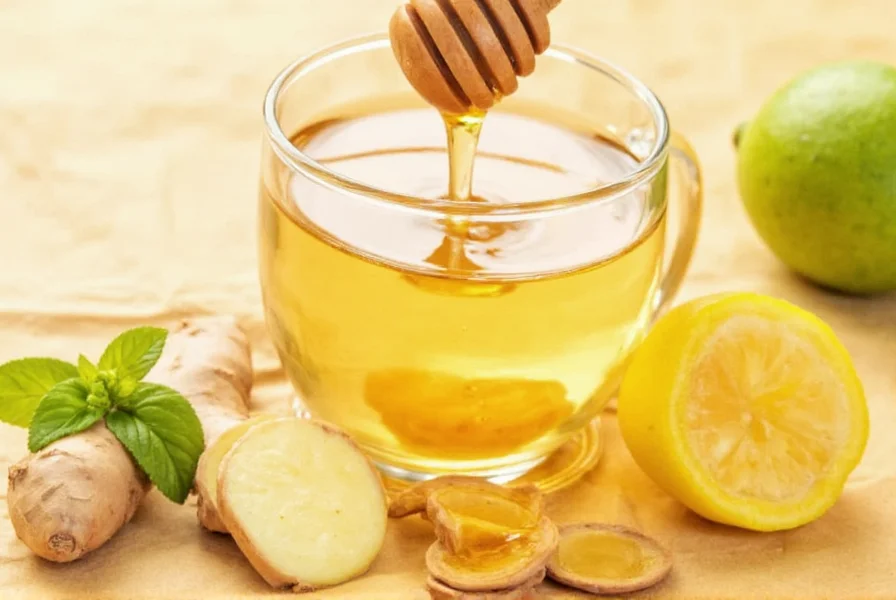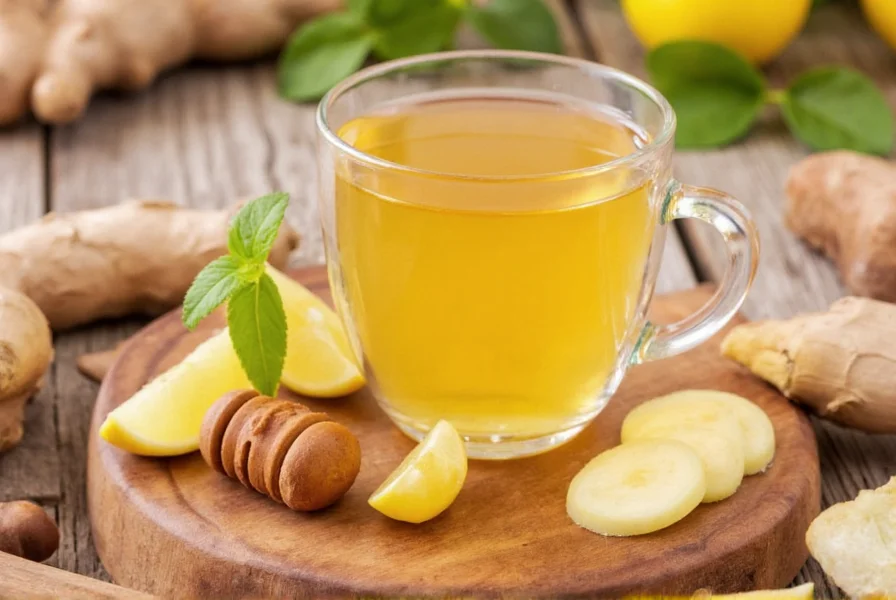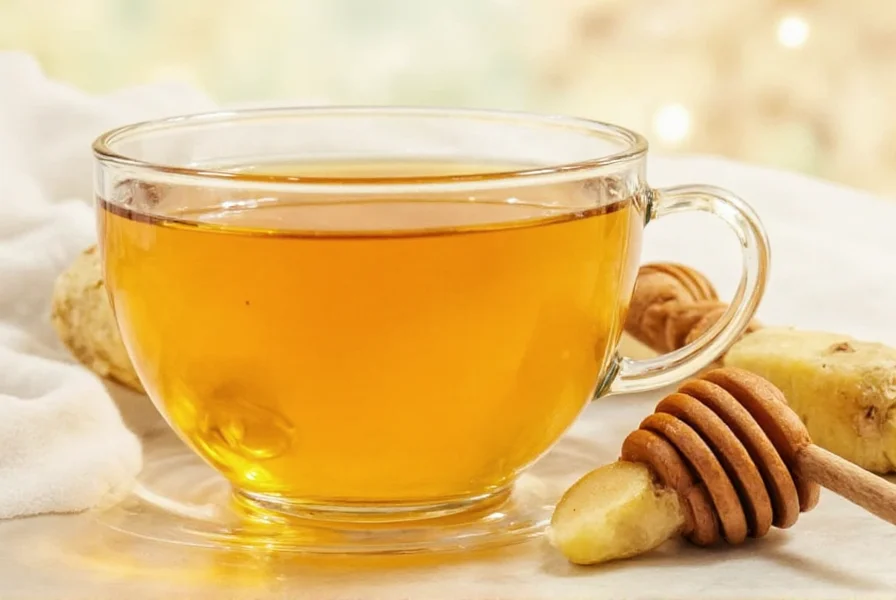For centuries, cultures worldwide have turned to ginger and honey tea as a go-to natural remedy. Modern research now validates many traditional uses of this simple yet powerful beverage. This comprehensive guide explores the evidence-based benefits, optimal preparation methods, and practical applications of ginger and honey tea.
The Science Behind Ginger and Honey Tea Benefits
Multiple clinical studies confirm ginger's effectiveness for nausea relief. A 2020 meta-analysis published in Nutrients found ginger significantly reduces pregnancy-related nausea and chemotherapy-induced vomiting. The active compound gingerol works by blocking serotonin receptors in the digestive tract.
Honey contributes more than just sweetness. Raw honey contains hydrogen peroxide and low pH levels that create an antimicrobial environment. Research in the Journal of Medicinal Food demonstrates honey's effectiveness against upper respiratory infections when combined with ginger's anti-inflammatory properties.

How to Make Ginger Honey Tea: Optimal Preparation
While commercial versions exist, homemade ginger and honey tea delivers superior benefits. Follow these evidence-based preparation steps:
| Preparation Step | Scientific Rationale | Optimal Duration |
|---|---|---|
| Peel and slice fresh ginger root | Maximizes surface area for compound extraction | N/A |
| Simmer in water (not boiling) | Preserves heat-sensitive compounds | 5-10 minutes |
| Cool slightly before adding honey | Maintains honey's enzymatic activity | 2-3 minutes |
Adding honey to water above 140°F (60°C) destroys beneficial enzymes. Always let your ginger tea cool slightly before stirring in raw honey to preserve its medicinal properties.
Evidence-Based Health Applications
Ginger and honey tea serves multiple health purposes with varying levels of scientific support:
- Digestive relief: Clinical trials show ginger reduces symptoms of indigestion and bloating within 30 minutes of consumption
- Cold and flu support: The combination provides symptomatic relief for sore throats and coughs, though it doesn't cure viral infections
- Inflammation reduction: Ginger's anti-inflammatory effects may help with arthritis symptoms when consumed regularly
- Nausea management: Particularly effective for morning sickness and motion sickness
Researchers at the University of Michigan found that regular consumption of ginger tea reduced inflammatory markers by 25% in participants with osteoarthritis. However, ginger and honey tea shouldn't replace medical treatment for chronic conditions.
Safety Considerations and Potential Side Effects
Ginger and honey tea is generally safe for most adults, but certain precautions apply:
- Limit to 4 grams of ginger daily to avoid heartburn or mouth irritation
- Diabetics should monitor honey intake (1 tablespoon contains 17g sugar)
- Avoid if taking blood thinners like warfarin without medical consultation
- Pregnant women should consult doctors before regular consumption
- Never give honey to children under 12 months due to botulism risk

When to Drink Ginger Honey Tea for Maximum Benefit
Timing affects the beverage's effectiveness for different purposes:
- Morning: Best for digestive stimulation and nausea prevention
- Before meals: Helps prepare digestive system (20 minutes prior)
- Evening: Soothes throat and promotes relaxation (avoid if sensitive to ginger's mild stimulant effect)
- During illness: Every 2-3 hours for symptomatic relief of colds
For ginger lemon honey tea for cold relief, add fresh lemon juice which provides vitamin C and enhances the antimicrobial effects. The citric acid also helps extract additional compounds from the ginger root.
Debunking Common Ginger Honey Tea Myths
Despite its benefits, several misconceptions persist about this natural remedy:
- Myth: It can cure the common cold
Fact: It provides symptomatic relief but doesn't shorten illness duration - Myth: More ginger equals better results
Fact: Excessive ginger can cause digestive discomfort - Myth: All honey has equal medicinal value
Fact: Raw, unprocessed honey contains beneficial enzymes destroyed in pasteurization - Myth: Works equally well for all types of nausea
Fact: Most effective for motion sickness and morning sickness, less so for medication-induced nausea
Understanding these distinctions helps maximize the natural remedy ginger honey tea's effectiveness while avoiding unrealistic expectations.
Conclusion: Integrating Ginger Honey Tea Into Your Wellness Routine
Ginger and honey tea represents a time-tested natural remedy with growing scientific validation. When prepared correctly using fresh ingredients, it offers genuine health benefits without the side effects of many pharmaceutical options. Incorporate this simple beverage as part of a balanced approach to wellness, recognizing both its proven benefits and limitations. For persistent health concerns, always consult qualified healthcare providers rather than relying solely on home remedies.
Frequently Asked Questions
What are the proven health benefits of ginger and honey tea?
Clinical research confirms ginger and honey tea effectively reduces nausea, soothes sore throats, and decreases inflammation. Ginger's gingerol compound blocks nausea pathways, while honey's antimicrobial properties combat throat irritation. Studies show it provides symptomatic relief for colds and digestive issues, though it doesn't cure underlying conditions.
How often can I safely drink ginger honey tea?
Most adults can safely consume 1-3 cups daily. Limit ginger to 4 grams maximum per day to avoid digestive upset. Those with diabetes should monitor honey intake (1 tablespoon contains 17g sugar). Pregnant women should consult their healthcare provider before regular consumption, especially during the first trimester.
Can ginger and honey tea help with weight loss?
While ginger may slightly boost metabolism and reduce appetite, ginger and honey tea alone won't cause significant weight loss. The honey adds calories, so excessive consumption could hinder weight loss efforts. Some studies suggest ginger may support modest metabolic improvements when combined with a healthy diet and exercise, but it's not a weight loss solution.
What's the difference between using fresh ginger versus powdered ginger?
Fresh ginger contains higher concentrations of active compounds like gingerol. Studies show fresh ginger has up to 30% more bioactive components than dried powder. Powdered ginger offers convenience but may contain fewer volatile compounds due to processing. For maximum benefits, fresh ginger root is preferred, though powdered ginger still provides therapeutic effects.
When should I avoid drinking ginger honey tea?
Avoid ginger honey tea if taking blood thinners without medical approval, as ginger may increase bleeding risk. Diabetics should monitor intake due to honey's sugar content. Those with ginger allergies or gastroesophageal reflux disease (GERD) may experience worsened symptoms. Never give honey to infants under 12 months due to botulism risk, regardless of ginger content.











 浙公网安备
33010002000092号
浙公网安备
33010002000092号 浙B2-20120091-4
浙B2-20120091-4